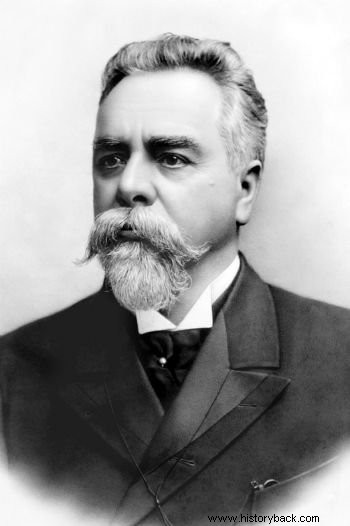Sales Fields (1841-1913) was the fourth president of the Brazil Republic . São Paulo farmer, lawyer, representative of the coffee elite of the State of São Paulo, took office in 1898, when the Republic was consolidated, but the country's financial situation was shaken.
The political and economic problems inherited from previous governments had led the country to a galloping inflation, aggravated by the external debt and the public debt. The situation had worsened with the fall in coffee prices in the international market. International banks began to put pressure on Brazil, demanding late payments.
 Campos Sales was the fourth president of Brazil
Campos Sales was the fourth president of Brazil
The president named Campos Salles, had not yet taken office when, on a trip to Europe, he negotiated with international bankers an agreement called funding loan , which boiled down to the following points:
- Brazil would receive a large loan of ten million pounds, payable in ten years, to consolidate the debt;
- A longer term would be established for the payment of the Brazilian external debt;
- The Brazilian government delivered, as a guarantee, the customs revenues of several ports, the Central do Brasil and the water service of Rio de Janeiro.
The anti-inflationary policy put in place by the Minister of Finance, Joaquim Murtinho, was characterized by the withdrawal from circulation and burning of large amounts of currency, the drastic cut of government expenditure, with the cancellation of public works and the dismissal of employees.
At the same time, new taxes were created and existing ones increased. The policy adopted cleaned up Brazilian finances, but affected industry and commerce and made life difficult for the country's poor and urban middle class.
To learn more:Brazil Republic.
Governors' Policy
The Campos Salles government laid the foundations for a great political agreement, whereby oligarchies of the various states, led by São Paulo and Minas Gerais, would remain in power for many years. The country did not have national parties.
The Constitution it favored decentralization, allowing states to levy large amounts of taxes and borrow abroad. During Campos Sales' presidency, such trends were accentuated, as the presidential power gave full support to the state oligarchies, being supported by them
Only deputies representing the situation in their respective states would be admitted to the federal legislature. After the elections, the Powers Verification Commission only qualified deputies with the support of the oligarchies of each state.
In Pernambuco the Rosa e Silva dominated, in Ceará the Acioly, in Amazonas the Nery, in Mato Grosso the Murtinho. Opposition elements could not be elected, had their mandates revoked. As the number of deputies was proportional to the number of inhabitants, the more populous states had a greater number of representatives in the National Congress, as was the case of São Paulo and Minas Gerais. The political supremacy of these two states, which is conventionally called the Coffee with Milk Policy , was only defined in its complete lines, from the Governors' Policy .
To learn more:Coffee with Milk Oligarchy and Politics.
Coronelismo
The colonel , characterized by prestige and power of mandate, was the local and regional political chief , usually a landowner, whose power was proportional to the number of votes he controlled (halter vote ) to ensure the victory of their candidates at the polls, based on the state oligarchies with whom he maintained very close relations.
The coronelismo is a government political system , insofar as it depends on the state governors (Oligarchies) for the execution of municipal improvements. The strength of the colonels was fundamental to explain the frauds in the electoral process . The vote was not secret, it was voted according to the will of the local powerful. The chances of opposition were minimal, without the support of the federal or state government.
Campos Salles remained in the presidency until 1902, when Rodrigues Alves , former governor of the State of São Paulo and former adviser to the Empire, was elected in the dispute against his opponent Quintino Bocaiuva . Rodrigues Alves was nominated by Campos Sales himself and supported by the Republican Parties of São Paulo and Minas Gerais.
To learn more:
- Halt Vote
- Coronelismo
- Rodrigues Alves
- First Republic
- Brazilian History Questions in Enem
